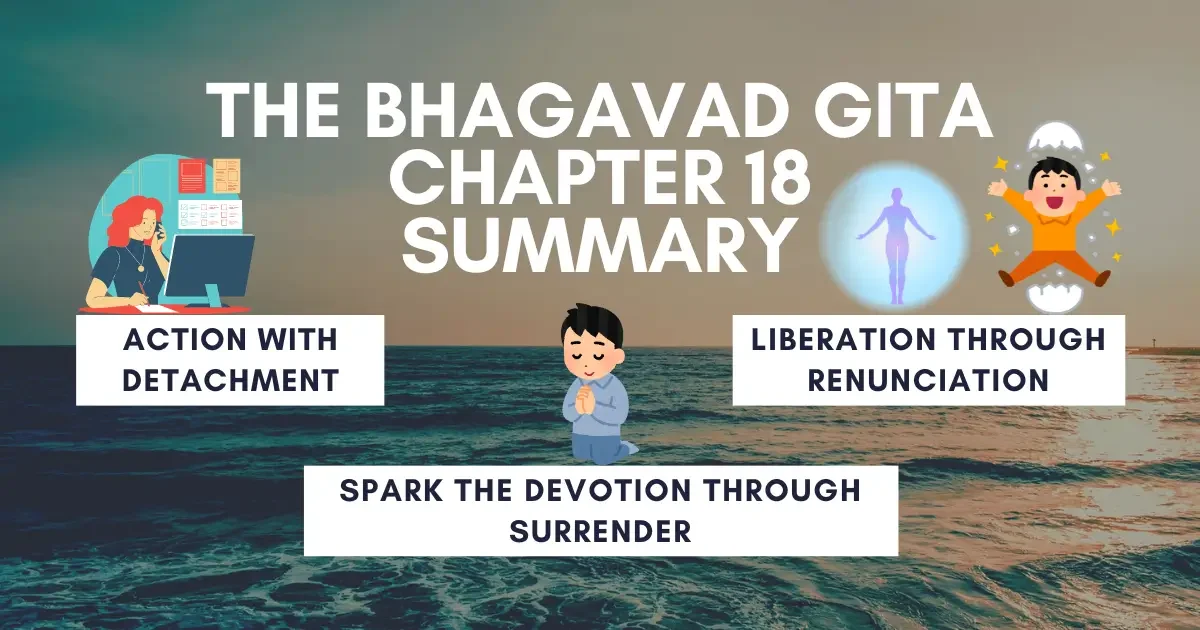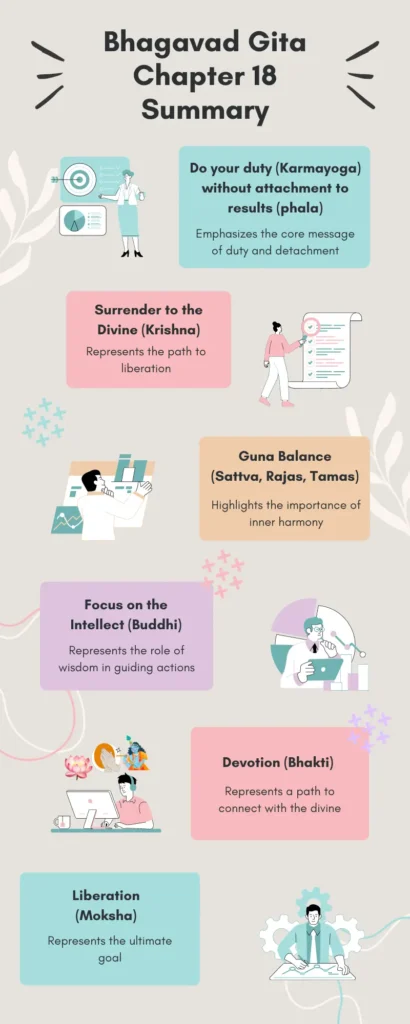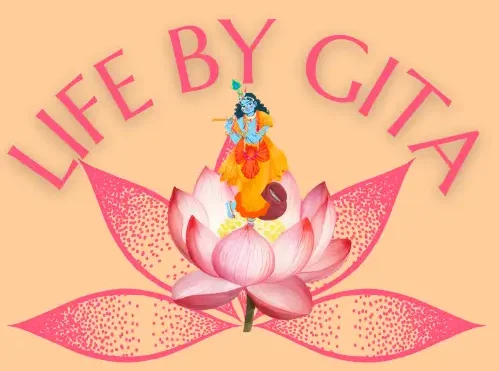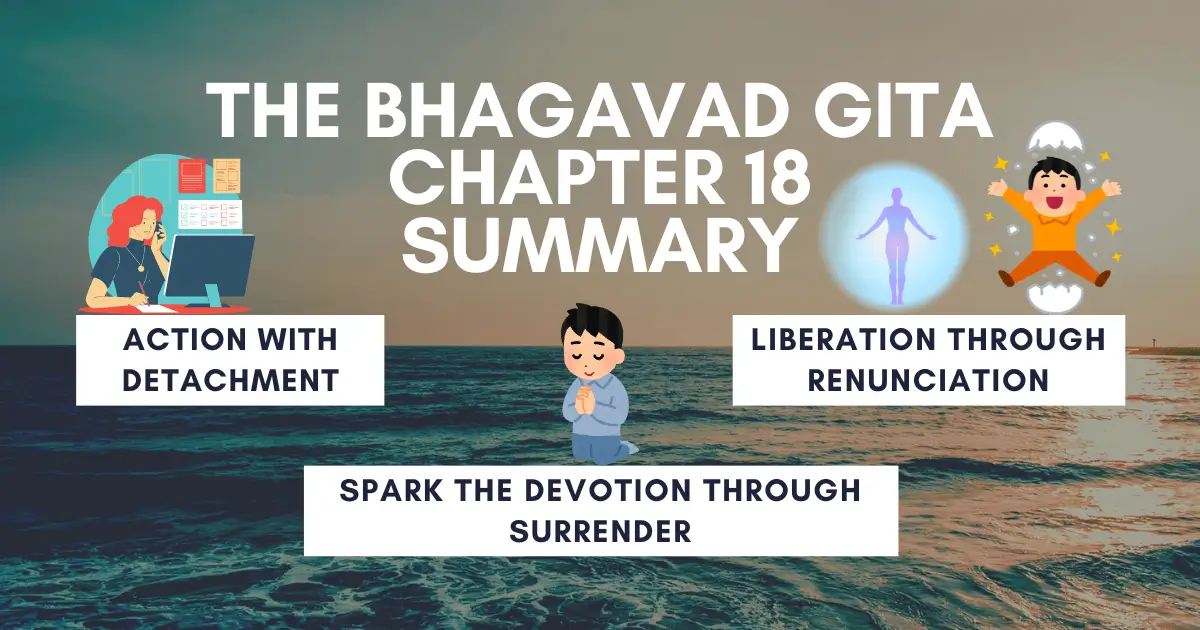
Welcome Readers! Today, we are moving to our final summary of the Bhagavad Gita Chapter 18, which ignites deep knowledge in Arjuna’s heart (and ours as well).
1. Introduction
Remember Arjuna, the warrior from the last chapter? Well, he’s still feeling unsure. He’s on the battlefield, surrounded by family and friends he doesn’t want to fight. But Chapter 18 of the Bhagavad Gita is here to help. It’s like a powerful drink full of wisdom that shows him the way to peace and freedom.
This chapter, also known as the “Moksha Sannyasa Yoga” (Liberation through Renunciation), acts as the grand finale, tying together the entire Gita’s message. So, grab your yoga mat (or a comfy chair, no judgment!), and let’s dive into the significant verses of Bhagavad Gita Chapter 18 summary!
2. Action with Detachment: The Key to Liberation
Arjun, ever the curious soul, starts this chapter by seeking clarity on renunciation. Lord Krishna breaks it down for him, explaining that true renunciation isn’t about abandoning actions altogether, but about letting go of desires for the fruits of those actions. A powerful verse that beautifully captures this essence is:
Chapter 18, Verse 6:
“Do your duties without getting hung up on the outcome.”
This resonates deeply with our modern lives, doesn’t it? We all have responsibilities – work, studies, relationships. But often, we get bogged down by the pressure to achieve a certain result. Krishna reminds us to focus on the action itself, giving our best shot with a detached mind. This allows us to experience the joy of doing, irrespective of the external rewards.
2.1 The Power of Gunas: Shaping Your Actions and Choices
Chapter 18 goes on to unveil the fascinating concept of gunas – the inherent qualities that shape our personalities and actions. Krishna already explained the three primary gunas in Chapter 14. Take a look here also:
- Sattva (purity): Associated with knowledge, peace, and clarity. Think of it as the calm and collected state of mind.
- Rajas (passion): Marked by activity, ambition, and striving. This is the go-getter energy that pushes us to achieve.
- Tamas (inertia): Characterized by laziness, ignorance, and negativity. It’s the “couch potato” energy that keeps us stagnant.
The key takeaway here is that none of us are purely made up of one guna. We’re a unique blend of all three, and the dominant guna influences our choices and actions. For example, someone driven by rajas might take on too much work, neglecting their well-being. Recognizing the gunas at play within us is crucial for achieving balance and aligning our actions with our true purpose.
Krishna mentions a bonus verse to illustrate this:
Verse 30:
“The wise mind in the nature of goodness (sattva), can tell right action from wrong, duty from mere busyness. It understands what truly brings fear and what fear holds no power. It sees what binds us and what sets us free.”
The above verse reveals the importance of Sattva guna by the influence of which one can differentiate what is right and what is wrong. In the contrary, by the influence of Rajas and Tamas gunas, the actions are diverted according to the above said nature of gunas. This understanding of gunas is a powerful tool for navigating life’s complexities. By observing our dominant guna and its influence, we can consciously choose actions that align with our higher goals and cultivate a more sattvic state of being.
3. Revealing the Perfect Yogi and the Path to Liberation
As we delve deeper into Chapter 18, Krishna paints a beautiful picture of the one who has attained spiritual perfection – steadfast in wisdom. These individuals possess qualities like unwavering faith, self-control, contentment, and equanimity. They see the divine spark in all beings and perform their duties without any attachment to the results.
Here’s a glimpse into their characteristics through a powerful verse:
Verse 54:
“When someone awakens to the oneness of Brahman, their mind finds perfect peace. They are free from sorrow and longing, seeing all beings as part of the same divine essence. This balanced perspective allows a yogi to find his/her highest devotion directed towards Me (the divine source).”
This state of equanimity and oneness with the divine is the ultimate goal of the Yoga of Liberation. But even for these perfected souls, Krishna emphasizes the importance of Bhakti (devotional love) as a means to connect with the Supreme Being.
4. Surrender and Seek Grace: The Final Message
The chapter culminates with Krishna revealing the most confidential knowledge – complete surrender to God. He advocates for abandoning all forms of religiosity and ego, seeking refuge solely in the divine. This complete surrender allows us to experience true liberation.

However, Krishna warns against sharing this knowledge with those who lack spiritual discipline, as they might misinterpret it. But for deserving seekers, imparting this wisdom is considered the highest form of love and service.
The impact of Krishna’s divine wisdom is evident in Arjun’s final words. Completely enlightened, he declares his readiness to fight as per Krishna’s instructions. This transformation from doubt to unwavering faith marks the victory of knowledge over ignorance.
Here are some deep verses that Lord Krishna designated as Confidential Knowledge. Read them carefully and grasp their meaning, which is surprisingly simple to understand. This knowledge serves as a guide for every living being, regardless of background, religion, or culture:
Verse 55:
“Only through unwavering love and devotion, one can truly understand the essence of my being. This knowledge leads to a state of complete awareness, where you and I are one.”
Meaning: Focus to the Path
Only by cultivating a path of love and selfless service can one unveil the true nature of the divine. This journey leads to a state of complete awakening and connection to the source.
Verse 56:
“Those devoted to me (Lord Krishna), even while engaged in all sorts of actions, find their ultimate trust in me. Through my blessings, they reach the everlasting and indestructible abode.”
Meaning: Focus to Devotion
Those whose hearts are filled with devotion can act freely in the world, yet their trust remains firmly anchored in the divine. By this divine grace, they reach a state beyond time and decay.
Verse 57:
“Let every action be an offering to Me, the highest purpose of your existence. Through the wisdom of yoga, find refuge in Me, and keep your mind ever-focused on My presence.”
Meaning: Focus to Action and Awareness
Infuse every deed with a sense of purpose, aligning it with the ultimate truth. Seek the guidance of inner wisdom, and let your awareness remain constantly connected to the source of all existence.
Verse 58:
“With Me ever in your thoughts, my blessings will guide you through any challenge. However, if pride clouds your judgment and you reject my guidance, you will surely falter.”
Meaning: Focus to Awareness and Ego
By keeping your awareness focused on the divine, you will find the strength to overcome any hurdle. But if arrogance blinds you to wise counsel, you will face inevitable hardships.
Verse 65:
“Let your thoughts turn to Me always, filled with devotion. Offer your worship and surrender to My presence. By following this path, you will undoubtedly find your way back to Me. This is My promise, for you hold a special place in My heart.”
Meaning: Focus to Practice and Reward
Cultivate a mind ever focused on the divine, and let devotion guide your actions. Through acts of worship and surrender, you pave the way to reach the source. This is My promise, for those who dedicate themselves are truly cherished.
Verse 66:
“Let go of all other paths and find refuge in Me alone. I will cleanse you of past transgressions, have no fear.”
Meaning: Focus to Surrender and Liberation
Release yourself from the burden of choosing duties. Surrender completely, and I will grant you freedom from past actions. Fear not.
Verse 70:
“I declare that those who delve into this sacred conversation between us offer Me worship through the wisdom they gain. This is My perspective.”
Meaning: Focus to Knowledge and Devotion
Those who dedicate themselves to understanding this sacred discourse find a path to devotion through the knowledge they acquire. This is My view.
Verse 71: The last guiding and The Most Important verse by Lord Krishna in Bhagavad Gita
“With a heart filled with faith and free from jealousy, even those who simply hear this wisdom will be cleansed of sin and reach the blessed realms where the virtuous reside.”
Meaning: Focus to Openness and Transformation
Open your ears with an open mind, free from bitterness. By listening to this knowledge, you can shed burdens of the past and find yourself in a place of peace, alongside the pure of heart.

5. Conclusion: A Song for Every Soul
The Bhagavad Gita Chapter 18 summary reminds us that liberation isn’t about escaping the world, but about transforming our relationship with it. Through selfless action, self-awareness, and a discerning mind, we can navigate life’s complexities and achieve lasting fulfillment. The wisdom of the Gita is a song for every soul seeking a path to peace and liberation.
The Bhagavad Gita’s Chapter 18, like a masterfully crafted finale, ties together the threads of knowledge and action. It dismantles the illusion of duty vs. detachment, revealing the path of liberation through selfless action and a surrendered heart.
We gain a deeper understanding of ourselves through the concept of gunas, learning to navigate their influence for a more balanced and fulfilling life. The chapter culminates with the ultimate secret – complete surrender to the divine.
This knowledge doesn’t remain confined to the battlefield. It serves as a practical guide for our daily lives. By applying its wisdom, we can transform our actions into acts of service, cultivate inner peace, and ultimately, achieve liberation from the cycle of desires and karmic reactions.
The Bhagavad Gita is a journey, not a destination. Chapter 18 serves as a powerful starting point, urging us to explore the depths of our being and our connection to the divine. So, embark on this exploration, embrace the transformative power of the Gita, and unveil the secrets that lie not just within the text, but within yourself.
We hope this Bhagavad Gita Chapter 18 summary along with the entire Bhagavad Gita has ignited your curiosity! Remember, the journey of spiritual exploration is a lifelong one. So, keep reading, keep reflecting, and keep growing!
Happy Reading!
Want to read the above summary offline? You can download the following pdf version:
Bhagavad Gita Chapter 18 Summary pdf
6. FAQs
Q1: Is Chapter 18 the most important chapter in the Bhagavad Gita?
A: While each chapter holds immense value, Chapter 18 serves as a culmination, providing a practical roadmap for achieving liberation.
Q2: How can I apply the teachings of Chapter 18 to my daily life?
A: By cultivating awareness of your actions, motivations, and the influence of gunas. Focus on performing your duties with a detached mind, cultivating inner peace, and surrendering your ego to the divine.
Q3: Is the Bhagavad Gita relevant in today’s world?
A: Absolutely! The Gita’s timeless message on performing our duties, understanding our motivations, and achieving inner peace resonates deeply in our modern lives.
Q4: Do I need to be a Hindu to benefit from the Bhagavad Gita?
A: No! The wisdom of the Gita transcends religion and culture. Anyone seeking self-improvement and spiritual growth can find valuable insights within its verses.
Q5: Where can I learn more about the Bhagavad Gita?
A: There are numerous resources available online and in libraries. Consider exploring commentaries by renowned spiritual teachers or attending discourses on the Gita.
Must Read: Which is the Best Bhagavad Gita Book in English for Beginners?
Further Reading Holy Bhagavad Gita

